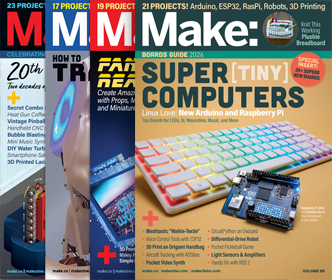
We started doing tool-review Tuesdays—soon compounded to “Toolsdays”—in early 2011, and 2012 has been the column’s first full calendar year. The reviews are written on a volunteer basis by MAKE staff and friends. Sometimes a manufacturer or retailer provides a review unit, but as often as not, the reviewer simply opens his or her toolbox and picks out a personal favorite.
Usually the tool is of modern manufacture and is available for sale, but sometimes we write about old tools, eBay finds, and family heirlooms. These “tool stories” usually add an element of human interest to the review, and have been some of my personal favorite Toolsday columns so far. In 2013, I hope to expand the series more in this direction, while still bringing in modern products that jump out at us as especially clever, novel, or useful.
Thanks to all our readers and reviewers for a great year!
I’m a modernist when it comes to design aesthetics: Form should follow function, and unnecessary ornament should be avoided. That’s why these scissors from Japanese toolmongers Engineer, Inc. are a bit of a guilty pleasure for me. I am way more susceptible to their gratuitous sci-fi greebles than I ought to be.
A paper notebook is something most of us, I think, are still using, at least in the early stages of our design processes. I’m naturally partial to our own branded Maker’s Notebook, but I liked Stuart’s short-and-sweet review, from back in June, of his low-contrast white-on-gray graph paper notebook. The idea is to keep your eyes on the drawings (or the data) instead of on the grid, which fades into the background unless you’re really looking for it. Statistical graphics guru Ed Tufte promotes a similar idea, and actually sells his own brand of low-contrast gray-on-white “ghost grid” graph paper to achieve the same purpose.
Chemists without access to a proper lab have to do the best they can with limited resources. Back in January, I was thrilled to discover that a simple air aspirator attached to my garage air compressor can provide a much cheaper, lighter, cleaner, lower-maintenance vacuum source than the traditional rotary-vane pump. And unlike a water aspirator, you don’t even need to have a sink handy. They can be a bit pricey if purchased new, but are easy to score on eBay.
MAKE intern Eric Chu has more hands-on experience with a greater variety of consumer-grade 3D printers than anyone else I know. He was instrumental in assembling and testing many of the 15 different printers we gathered at MAKE HQ to prepare the MAKE Ultimate Guide to 3D printing, and has continued to experiment with and use many of them on a day-to-day basis as part of his work in the MAKE Labs. His recent review of 3D-printing start-up QU-BD’s silicone elastomer heated build pad really shows off that experience base, and is probably the best first review I’ve ever had from a novice writer.
In June, Stuart Deutsch brought out his favorite pair of wire strippers and wrote, with his characteristically sharp eye for design, about what makes them better than others. Many of us use wire strippers on a daily basis, and reviews that analyze a common tool in great detail provide a nice opportunity for readers to compare notes about their personal favorites in the comments. I’ve discovered some gems this way, myself.
This July review from photo editor Gregory Hayes is the first of a number of “nostalgia” reviews I’ve included here. Greg, who communicates with words as well as he does with pictures, movingly describes his childhood relationship with his handyman grandfather, who loved to fix and build things, preferring careful, patient work with manual tools. Using Grandpa’s “eggbeater” style hand drill stands out in Greg’s memory, and he jumped at the chance to pick one up again when Garrett-Wade offered their modern German-made eggbeater hand drills to us for review.
Here’s my own entry into the “nostalgia” category: My Dad’s Easydriver ratcheting screwdriver was one of the first tools to make an impression on me when, as a child, I’d “help” him make and fix stuff out in the garage. He’s still got it, and was kind enough to let me borrow it so I could photograph and write about it for this review. The Easydriver, sadly, is not manufactured anymore, but they are still relatively easy to find on eBay. I also dug through the online archives of Popular Science, Popular Mechanics, and the US Patent Office to bring a bit of the Easydriver’s history to light.
This August piece from Michael Newman is probably the most persuasive review I’ve seen all year. Michael has a background in DIY CNC tool-hacking, and was excited about the Shapeoko from its first appearance on Kickstarter, to its arrival on his doorstep, to its final assembly and successful operation. That enthusiasm shines through in every part of his review, and is positively infectious. He took great pictures, and struck a nearly perfect balance between providing too much detail and providing too little. I often refer new reviewers to this piece as an example of how to do it right.
Garrett Wade Yankee Push Drill
This review of Garrett-Wade’s remake of the classic Yankee push-drill, written by Maker SHED “Evangelist” Michael Castor back in April, drew a larger response from our commenters than any other Toolsday review in the history of the series. Like Greg’s grandpa’s “eggbeater” hand drill, and my Dad’s “Easydriver” ratcheting screwdriver, Michael’s father’s old Stanley push-drill made a powerful impression on him as a child. When GW offered to send us a review unit, Michael went out of his way to do a careful side-by-side comparison with the heirloom tool.
Dymo Metal Embossing Tapewriter
This review tops the column for all-time traffic numbers. Cory linked to it from Boing Boing and, to date, it’s had more than 50,000 views. I like it, personally, because it’s completely noncommercial—Dymo still sells a new-model “industrial” aluminum label embosser, but it costs hundreds of dollars, and this old one I scored cheap on eBay is essentially the same tool (though they’re apparently a lot harder to find since this piece made the rounds). Commenter Jessica Garrett Martin writes:
I am consulting for a company in Philadelphia selling vintage chrome Dymo tapewriters. Thanks to these posts, we sold 80 in one day. We don’t have many left but you can contact me at martin_id@verizon.net. We have Dymo 1550 kits and deluxe kits as well and some aluminum and stainless steel tape and more. We have LOTS of old Dymo stuff so ask away!
The comments on this review also directly inspired a Make: Project about how to emboss labels on scrap aluminum sheet cut from soda cans, and indirectly inspired a second Make: Project about how to take “invisible glass” photographs.
ADVERTISEMENT
















